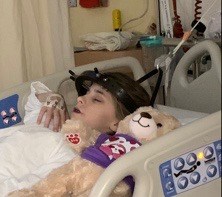
Crossroads student Ariel Carr is in a traction bed in the Hospital for Sick Children in Toronto, with a halo bolted to her head and weights attached to the halo to straighten her spine. She is expected to be in the traction bed for six to eight weeks, with another surgery after that. (Denise Carr)
Ariel Carr is a very strong little girl, says her mom Denise.
She has to be.
The tiny 12-year-old had her first surgery Friday to straighten her spine, twisted by scoliosis, in a two-and-a-half hour operation at Sick Kids Hospital in Toronto.
It involved using eight bolts to attach a traction halo to her head, two above each eyebrow and two in front of each ear, describes Denise. By Saturday, before time for the bolt sites to begin to heal, five pounds of weights were added to the halo, with two pounds more being added each day.
“They will continue doing that up until they get to 24 pounds,” says Ariel’s mom, who is struggling with watching her daughter in pain, and feeling overwhelmed with feelings of helplessness to stop it. After that, she will remain in traction with the halo for four to six weeks, says Denise, and Ariel is already asking when the halo can come off.
It won’t, for several weeks. The weights are removed when she goes to the washroom, and when she is moved into a traction chair, in which Denise wheels her around just to get her out of her room.
She got her favourite drink from Starbucks Saturday, a double chocolate chip frappuccino, but she was in too much pain to drink it, and most of it was thrown out.
Nurses are trying to get her to take Ensure, a nutritional drink for people with health issues. She isn’t having much success with that either, but she’s so tiny, she can’t afford to lose weight, says Denise.
Ariel has been overcoming obstacles since birth, when as a premature baby she was born at three pounds, 15 ounces, with no movement on her left side. Doctors at the time suggested she might never walk.
She has, and played hockey as well, but still with some difficulties on her left side.
At 47 inches tall, and 43 pounds, Ariel is small for her age, but the surgery and weights could add another inch or more to her height, says Denise.
There will be at least one more surgery, which will involve shaving some bone off the top of her spine, which is now shaped almost like a candy cane, curving into her neck. She’s been told it’s expected to be a nine-and-a-half hour operation, but that won’t happen until after the weeks in traction.
There might be a third operation, says Denise. When Ariel went through a growth spurt recently, her ribs grew as well, causing them to grow into her hip on her left side, and to press into her lungs. That has been causing her pain, making movement difficult, and diminishing her lung capacity, making her tire easily. Depending on how well this stage of her treatment works, she may have to go back into the operating room to have one or more ribs removed.
Denise sleeps in Ariel’s room, and never goes far from her side. Her husband Ace plans to spell her some nights — one of them will have to be with Ariel 24 hours a day while she’s in the hospital. They have to pay for parking, food, and gas going back and forth, and since they both work at the same place, they don’t want to both be off at the same time. They’ve been warned by the hospital it could cost them $5,000 a month. The family has set up a GoFundMe page to offset the costs. To help, visit https://ca.gofundme.com/f/ariels-scoliosis-battle.
Denise says she leaves Ariel briefly for some fresh air, but always with her cell phone, knowing Ariel also has a phone and can call her.
She sometimes uses that time to let her emotions out, crying the tears she doesn’t want Ariel to see, she says.
“When she knows I’m upset, she tells me not to be. She worries about me. Sometimes it seems like she’s the parent and I’m the child. She’s so tough, but she is in pain, and it is so hard to watch and not be able to do anything to help her.”
Denise takes her to the washroom, and for trips around the hospital in the traction chair, but it’s hard for Ariel to see much — she can’t move her head.
Ariel is spending her awake time on an iPad, which she can hold up high enough to be able to see while she’s lying down. Even when sitting, the halo prevents her from moving her eyes up or down — her area of vision is very limited.
She draws comfort from a large teddy bear given to her by her friend Brooke before she left to go to the hospital.
“It has Brooke’s voice on it telling Ariel she loves her, and that she is strong,” says Denise.
“Ariel listens to it all the time. Brooke even gave her a birth certificate with it saying the teddy’s name is Angel, and she was born Feb. 7, the day of Ariel’s first surgery.”
It’s always beside her, and sometimes acts as a soft pillow for her head, Denise says. “I’m so glad she has it.”
It’s been a terrifying time for Ariel and her family, and it’s far from over. Although Ariel is surprisingly strong for her age, says her mom, she admitted to being scared the night before her operation. She asked her mother if she was going to die, says Denise, becoming emotional as she recalls that difficult conversation.
“I told her she was coming home, that we’d be coming home together. And we will.”